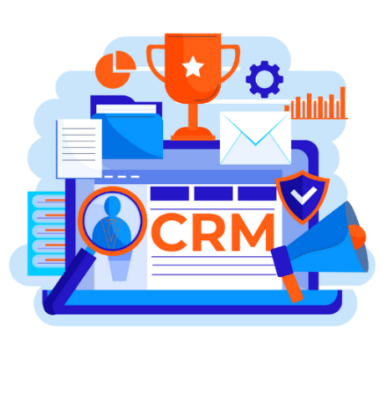As market dynamics shift and challenges emerge, businesses either stall or stay steady. The difference lies in structure. When every part of the operation is synchronized, even difficult days can be managed. Teams stay aligned, customers get timely responses, and tasks progress without unnecessary delays. CRM tools are the backbone of that clarity—they transform scattered information into organized processes, preventing things from slipping through the cracks. With the right system in place, your business can remain calm under pressure and keep moving forward.
Streamline Communication to Avoid Disruptions
Miscommunication leads to unnecessary risks, whether it’s sending outdated messages to clients or overlapping tasks within your team. These delays can severely affect your ability to stay on track.
CRM systems help by centralizing communication. With all interactions—whether with customers, vendors, or team members—in one place, everyone can access real-time updates, reducing the need for status reports. Work can move forward without hesitation. For high-volume portfolios, CRM tools offer structure by storing critical data, automating workflows, and providing clear visibility into client relationships. This makes it easier to manage more accounts without losing control, ensuring smooth communication and business continuity.
Strengthen Customer Relationships with Data
Customer loyalty is built on consistent, meaningful interactions. When you remember a customer’s last request or offer relevant recommendations, you show that you care. A CRM system allows you to do this by providing context for every interaction. Every note, call, and purchase is stored where your team can easily find it.
You can segment contacts based on their needs or history, and even trigger follow-up actions based on specific customer behaviors. This level of personalization helps maintain long-term relationships, and when challenges arise, your team can quickly provide answers since they’re already familiar with the customer’s history. This continuity is key to building trust, especially during difficult times.
Ensure Continuity During Staff Turnover
Employee turnover is a major disruptor for any business. When a team member leaves, projects stall, deadlines slip, and customers lose confidence. But when you rely on a CRM, your business remains steady.
A CRM tracks all messages, tasks, and timelines in one system, making it easier for new hires to pick up where others left off. No need to ask what happened last week—new team members can log in, check the records, and continue the work seamlessly. Clients also benefit, as they don’t have to repeat themselves and can expect consistent service. This continuity ensures that trust remains intact, even through staff transitions.
Support Real-Time Decision-Making with Analytics
Slow decisions can be costly. Delays can cause problems to worsen, opportunities to slip away, or mistakes to go uncorrected. With a CRM, you get the real-time data needed to make informed decisions on the spot.
CRMs offer automatic dashboard updates, tracking metrics like lead volume, deal progress, and customer activity. This level of visibility means you can act quickly when something is off-track—whether it’s a drop in sales or an underperforming campaign—before the issue snowballs. This ability to pivot with precision helps teams stay focused and minimize time spent guessing.
Anticipate Risks with Scenario Planning
Business disruptions are inevitable, whether from sales drops, supply chain delays, or changes in customer behavior. Businesses that thrive during these times are those that plan ahead, using scenario planning to prepare for unexpected shifts.
A CRM provides valuable insights by tracking patterns such as churn signals, lead velocity, and purchase frequency. If something changes, you’ll spot it early. This foresight allows you to respond proactively rather than react in panic. Some CRMs integrate with forecasting tools, allowing you to model different scenarios based on historical data, so you can prepare for potential downturns or growth spikes.
Foster Team Resilience with Shared Visibility
When information is confined to one person or a single inbox, the entire team slows down. Tasks get repeated, details get overlooked, and coordination suffers. This builds stress and frustration.
A CRM solves this by providing full visibility into every task, note, contact, and timeline. With everything in one place, the team can collaborate more effectively, even if someone is absent. If a lead calls back or a task gets missed, someone else can step in without missing a beat. This shared visibility fosters confidence and trust, helping teams stay steady under pressure and ensuring that no important detail is overlooked.
Review, Adapt, and Scale CRM Workflows
Systems that don’t evolve with the business will eventually break down. What worked for ten clients might not work for fifty. As markets shift and teams grow, it’s essential to regularly review and refine your CRM workflows.
Look at your automation rules, tags, and task sequences. Are they still serving your current needs? Remove outdated steps, clarify unclear processes, and add new ones where necessary. This regular maintenance prevents larger breakdowns as your business scales.
When you review and adapt workflows often, you ensure that your CRM remains an asset, not a hindrance. As your business grows, a well-maintained CRM will help you handle new demands without being caught off guard.
Conclusion
A CRM system is more than just a database—it’s an essential tool that helps your business operate smoothly and efficiently, even in times of uncertainty. It streamlines communication, keeps customer data accessible, supports real-time decision-making, and allows you to anticipate and plan for risks. In a resilient business, systems like CRMs don’t just help you keep track of what’s happening—they provide structure that allows you to respond with agility and maintain continuity in all aspects of your operations. By ensuring your business is built on solid processes, you can move forward, even when the road ahead gets rocky.



